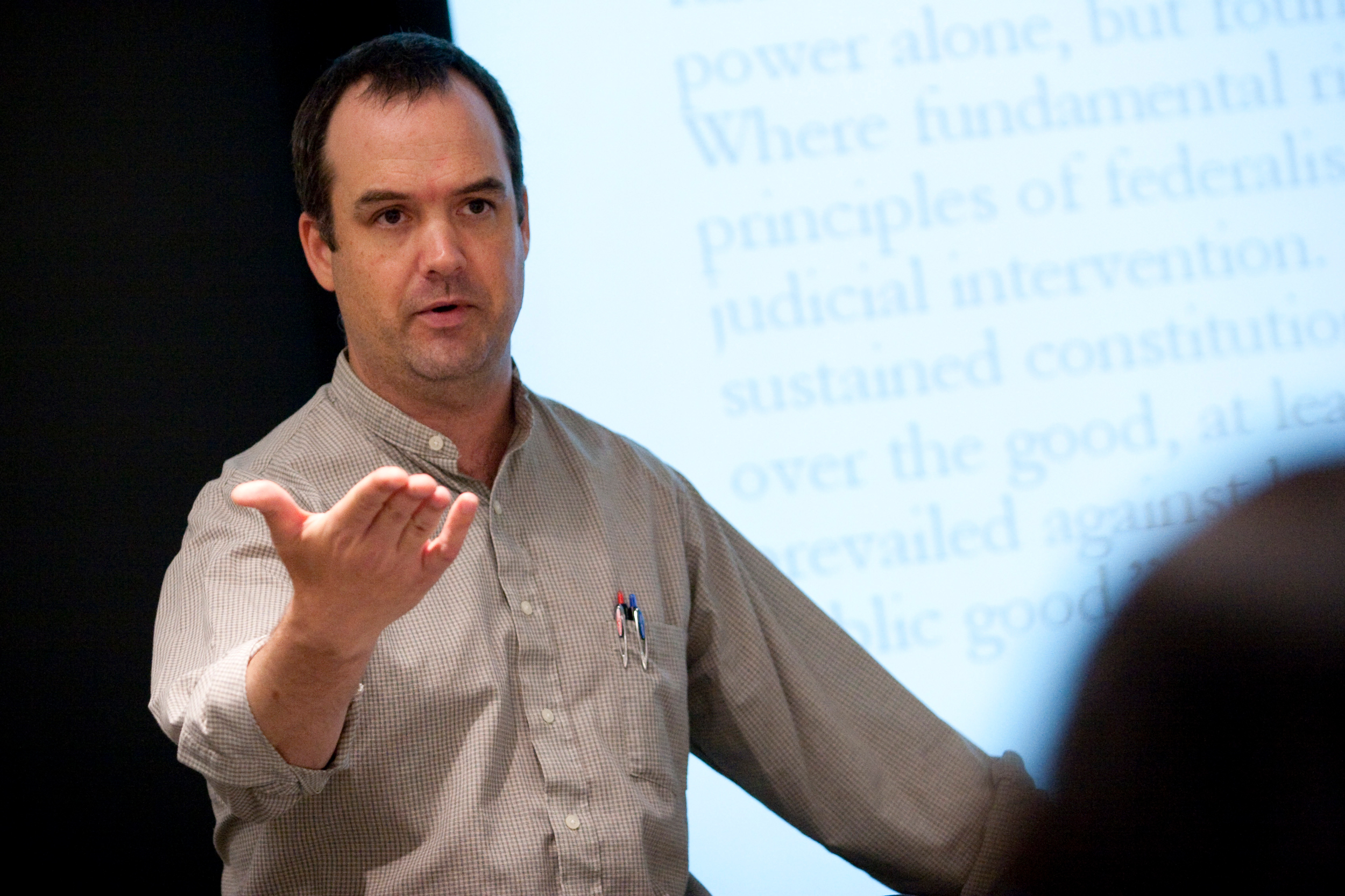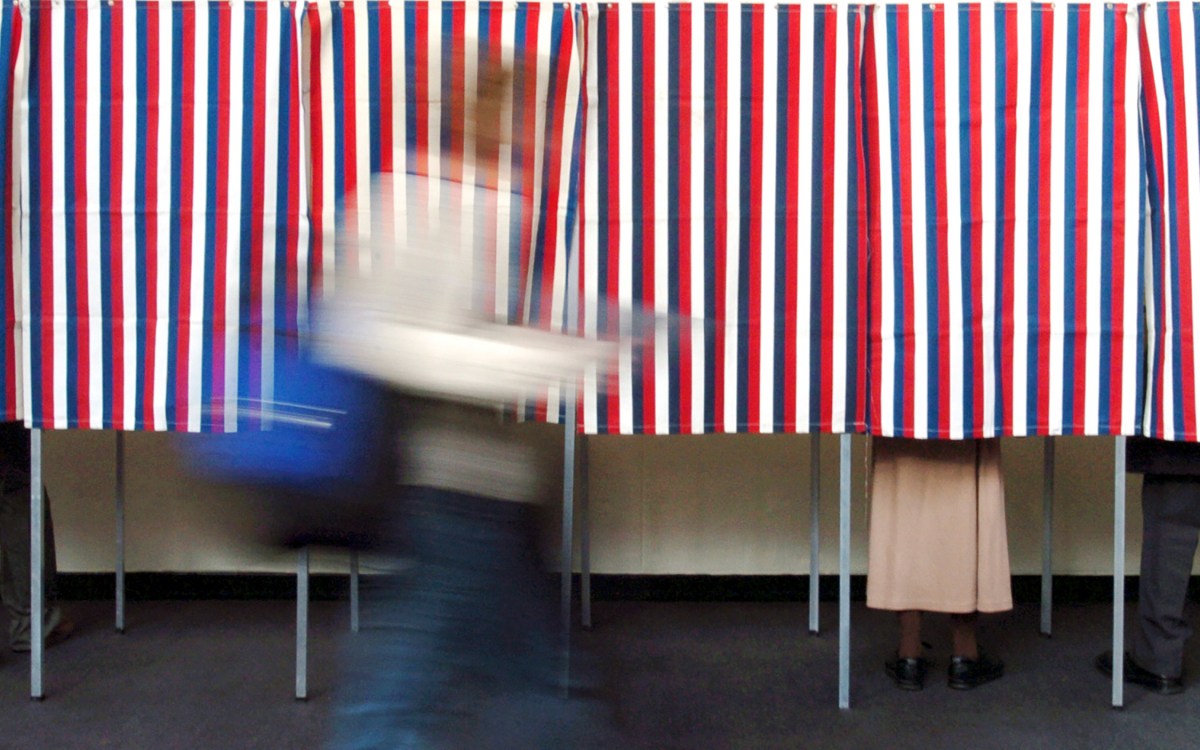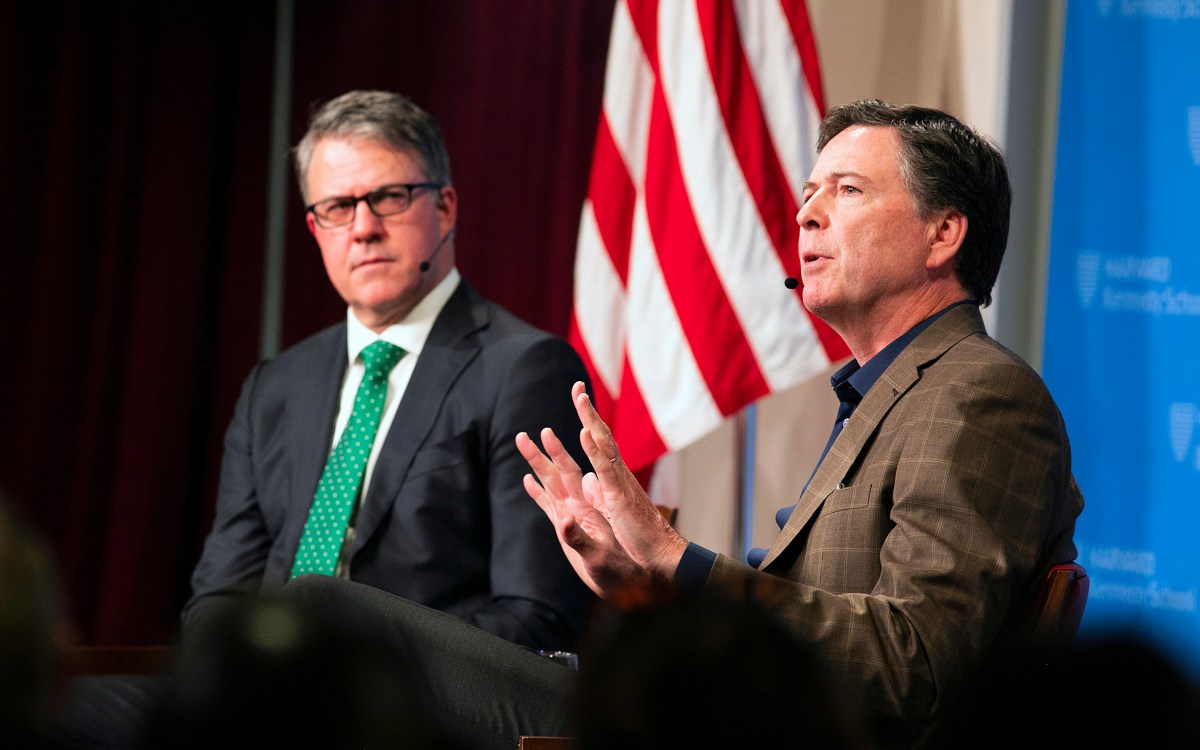
Illustration by Eva Bee
How to change an election
With both sides wary of tampering, a government professor tries to game the game on what tactics could follow a close result
In 2016, presidential candidate Donald Trump predicted that the election would be rigged against him, though the charge fell away when he went on to win. Two and a half months before that election, Roger Stone, a longtime Trump friend and adviser who was later convicted of obstructing a congressional investigation, penned an op-ed explaining how to “strip and flip” votes in electronic machines.
In 2020, both Trump and his opponent, former Vice President Joe Biden, suggest that the other may try to “steal” the election. Biden predicted Trump would seek to delay it, an idea that Trump floated several weeks later on Twitter, and try to suppress mail-in voting by undercutting the U.S. Postal Service and claiming that practice enables voter fraud. Trump and top administration officials, including Attorney General William Barr, have repeated that claim often, with Trump refusing to commit to accept the results of the election if he lost a close race, and Barr saying he would leave office on Jan. 20, 2021, provided the election results are “clear.”
On Tuesday, attorneys general from 20 states, including Massachusetts, sued the Trump administration over staffing and service changes that Postmaster General Louis DeJoy had ordered. DeJoy said Tuesday he will suspend service cutbacks until after the election to avoid the appearance that the moves could be directed against mail-in voting.
With partisan tensions, a polarized electorate, and the COVID-19 pandemic, this election is shaping up as tumultuous even if no malfeasance occurs. An Aug. 3 report from the Transition Integrity Project, a bipartisan group of political, government, and academic experts that ran election crisis-planning exercises to game out what might happen between now and Inauguration Day, predicts “lawsuits, divergent media narratives, attempts to stop the counting of ballots, and protests drawing people from both sides.” The report expects Trump “will very likely use” his presidential powers to aid his campaign and says “there is a chance” Trump “will attempt to convince legislatures and/or governors to take actions — including illegal actions — to defy the popular vote.”
Daniel Carpenter, Allie S. Freed Professor of Government in the Faculty of Arts and Sciences, says the prospect of a contested election, and even a constitutional crisis, is very real. He, who recently wrote about some similar issues in the Washington Post, spoke with the Gazette about some of the potential clashes at the federal and state level, and what remedies, if any, are available.
Q&A
Daniel Carpenter
GAZETTE: If the presidential election is not settled by election night or shortly thereafter, there are two potential scenarios in which state officials could affect the outcome by tinkering with the Electoral College. One that’s been raised of late is if Biden appears to win the popular vote in a key state like Florida, but, say, the governor, a Trump ally, or top state election official, refuses to send any electors to be certified, what happens then?
CARPENTER: If the Electoral College is underpopulated and the courts don’t intervene, or maybe even if they do, the election is thrown to the House. Under the 12th Amendment, the states vote by delegations. The Democrats currently control a majority of members, but if the House looks exactly like it does right now, the Republicans would have a majority of delegations. And if everyone voted in a purely partisan manner, the Republicans could constitutionally, under those circumstances, award the presidency to Trump.
I argue two things. First, this “underpopulation” of the Electoral College is inconsistent with the spirit and the intent of the 12th Amendment. The procedure there was designed for multiparty dynamics in which so many different candidates win state majorities that no one candidate has a majority of Electoral College votes, as we last saw in 1824. It wasn’t intended for a world where no one can get an Electoral College majority because the states have decided not to “show up” to the College.
Second, I argue that if we’re already in the world of constitutional hardball, Speaker [Nancy] Pelosi could convene the Congress early in January and reconstitute the delegations and give the Democrats a temporary majority sufficient to elect Biden the president in that House vote. (I say the speaker, but it’s really the majority; she would have to have her majority in line.) She would use the contested election power. They would choose enough Democrats in contested elections, and do so very quickly, to give the Democrats a majority of delegations and to reverse what happened in Florida, under the scenario posed.
GAZETTE: A second scenario is that a state sends its slate of electors to Washington, D.C., for certification by Congress, but they cast votes for the losing candidate, not the winner. How might that play out?
“We have a tradition of peaceful transfers of power in the United States, and from November to Jan. 20, 2021, we may well witness the greatest test of that tradition in the history of the republic or since the Civil War.”
CARPENTER: Let’s assume Biden wins a plausible victory and Republicans move to undermine it, instead of the reverse. Assume, for instance, in Arizona or North Carolina, Biden wins a state majority, but the state legislature tries to step in and say “OK, no, we are taking it upon ourselves to award our delegates to Trump.”
The first thing to note is that state legislatures used to choose the electors in lieu of popular election very commonly. South Carolina chose electors this way as late as 1868. The question is whether states would have to pass laws to allow themselves to choose the electors again. That’s critical, because if they have to pass laws, then the governor can veto the statute. And a number of states where this might be possible — Michigan, Pennsylvania, North Carolina, and Wisconsin — have majority Republican legislatures, but also have Democratic governors. So the question at this point is: Can state legislatures install their preferred Electoral College slates without first changing the statutes that give state voters the say in Electoral College slates? Or if somebody decides to bring suit against the state legislatures for declaring slates, what then happens in the state courts or the U.S. Supreme Court? It gets endlessly legally complicated here.
GAZETTE: If Trump or Biden believes the results in certain states are illegitimate or inaccurate, what is their recourse other than filing lawsuits in federal court in each of those states?
CARPENTER: Here’s both a blessing and a curse of our system. States run election administration in the United States. It’s not national. The blessing is that if you have a potential authoritarian in the White House, he can’t use the Department of Justice (or whatever “Department of Elections” would exist were the federal government to run them) to impose his will upon election administration. The curse is that states can get away with a lot of things, as occurred during the Jim Crow era and as still occurs today.
The state-level theater of election administration does open up possibilities for nefarious activity. One can imagine authoritarian governors or state legislatures declaring a COVID emergency and closing polling locations. Another would be calling out the National Guard. And at the federal level, there is fear that Trump or Barr will try using federal security forces as we saw in Portland, Ore. The official rationale would be to police places where they claimed there was “domestic terrorism,” but really what they would be doing is trying to intimidate voters, especially people of color.
Short of courts intervening, it’s not clear much can be done officially to counter this. And I say that with some disappointment. I think the Transition Integrity Project (TIP) is accurately focusing on the role of other societal actors, including corporations, the military, a range of other organizations and institutions of our society, including Republican governors, senators, and members of Congress, or former presidents, who would emerge to challenge these actions publicly, things like that.
The integrity of these elections depends a lot on both civil servants and volunteers at the state and local level. It really does. That’s both a bad thing and a good thing. The good thing is those people are not answerable to the president in any way. The bad thing is that there’s a lot of heterogeneity there, a lot of variance.
The TIP report is absolutely right to say that we have to get away from this idea of “election night.” For many times in our history, we didn’t know the result of state tallies for weeks, so that’s not historically unprecedented. If everybody behaves purely according to partisan preference, that’s going to be deeply problematic. At some point, you’re going to need high-level Republican officials from some of these states saying, “It looks like Trump has lost” if, in fact, that happens. That’s going to be really crucial to the stability, as well as to the integrity, of the process.
The prospect of a contested election, and even a constitutional crisis, is very real, says Daniel Carpenter, Allie S. Freed Professor of Government.
Stephanie Mitchell/Harvard file photo

GAZETTE: Given the expected surge in mail-in voting this fall, many people have raised questions about recent personnel and operational changes at the U.S. Postal Service made by the new postmaster general. Is there anything to prevent a deliberate slowdown of the U.S. mail, for example?
CARPENTER: The new postmaster general is a Trump ally, and it looks like he’s curtailing service rather significantly. We appropriately make it difficult to fire people in the postal service, but you can reassign them and transfer them, and that’s what he did with a bunch of people. That’s going to be a problem. If there’s been a postal slowdown, it’s not something that the courts have traditionally stepped in to say, “You need to speed up mail.” And so there is, I think, a genuine concern there. Now, there are different response strategies Democrats can use. One is to have people vote even earlier. Another possibility is that postal employees focused on these ballots may essentially defy some of their superiors and continue to process them or to focus on them. Not rank illegality, but they’ll just “will do their civic duty.” He’s trying to forbid overtime; it’s not clear how enforceable that is.
GAZETTE: When questioned by members of the House Judiciary Committee in late July, Attorney General Barr said even if President Trump refused to accept the results of the election and step down, that he would leave office “if the results are clear.” Although the Department of Justice (DOJ) has a practice of laying low around elections, how much latitude do attorneys general have in election matters? Are they empowered to determine whether results are clear or not?
CARPENTER: Normatively and legally, the DOJ has at least three powers. One, it can issue Office of Legal Counsel guidance, saying “here’s what we think is legal.” Second, it can bring suit. And third, it does have “guns,” which is to say, it has the FBI and other enforcement powers, being used in concert now with the Department of Homeland Security. But in terms of declaring election results, no. That process lies outside the executive branch. Some of it is in states and then some of it is in Congress. That part Barr can’t do. At no point does an attorney general declare that “there is a victor” in the presidency or in a congressional or senatorial race.
GAZETTE: He couldn’t declare that voting procedures or ballots in areas favorable to Biden are illegitimate as a way to keep them from being counted?
CARPENTER: Barr could file suit and try to take some administrative action, but then the matter ends up in a court of law. Then courts play a determining role, at least officially. Where it would be harder to stop him, although I think not impossible, is these administrative actions, like you saw with the clearing of Lafayette Square. But outside of a lawsuit, it’s harder for Barr to intervene in election administration that is essentially a state-level matter. He can always file suit and say “we think there was illegal vote-harvesting or illegal mail-in ballots” or things like that, but then that becomes a judicial question precisely because he is attorney general and the suit is brought by the Department of Justice. Then the federal courts get the final say.
GAZETTE: Other than the 20th Amendment, which establishes that the term of a president and vice president begins at noon on Jan. 20 following the election, does anything in the Constitution ensure the peaceful transition of power?
CARPENTER: We have a tradition of peaceful transfers of power in the United States, and from November to Jan. 20, 2021, we may well witness the greatest test of that tradition in the history of the republic or since the Civil War. And the reason we may face that test is because not just Trump, but also his allies in the states and in the federal executive branch and in Congress and even among militias, may try to prevent his appropriate constitutional and legal removal from office if Biden wins a real electoral victory.
If there is underpopulation or false population of the Electoral College, then we enter a constitutional crisis. A constitutional crisis is where constitutional actors are taking on powers that they do not normally take on, that they might have but might not have, and where all these things are kind of playing out for the first time. People have raised some question over whether the Senate and the House would have some discretion in certifying those Electoral College slates. Again, we’re in completely uncharted territory here. I don’t know, and once we’re in that scenario, I don’t think anybody knows.
This interview has been edited for clarity and length.







